Carnival Tourism: HR Strategies, Revenue, and Contract Law Analysis
VerifiedAdded on 2020/10/22
|16
|3746
|188
Report
AI Summary
This report provides a comprehensive analysis of Carnival Corporation and PLC, a British leisure travel company, focusing on its HR life cycle, revenue management, and legal compliance. The report examines the five stages of the HR life cycle (recruitment, education, motivation, evaluation, and celebration) and their impact on talent management and employee retention. It also explores performance management plans, including planning, monitoring, developing, rating, and rewarding. Furthermore, the report delves into the legal aspects of the tourism industry, specifically contract and employment law, food safety, and ethical principles. It analyzes the impact of these factors on decision-making, revenue generation, and market segmentation. The report also highlights the importance of historical demand, booking patterns, and pricing strategies in revenue management. The document is contributed by a student to be published on the website Desklib. Desklib is a platform which provides all the necessary AI based study tools for students.
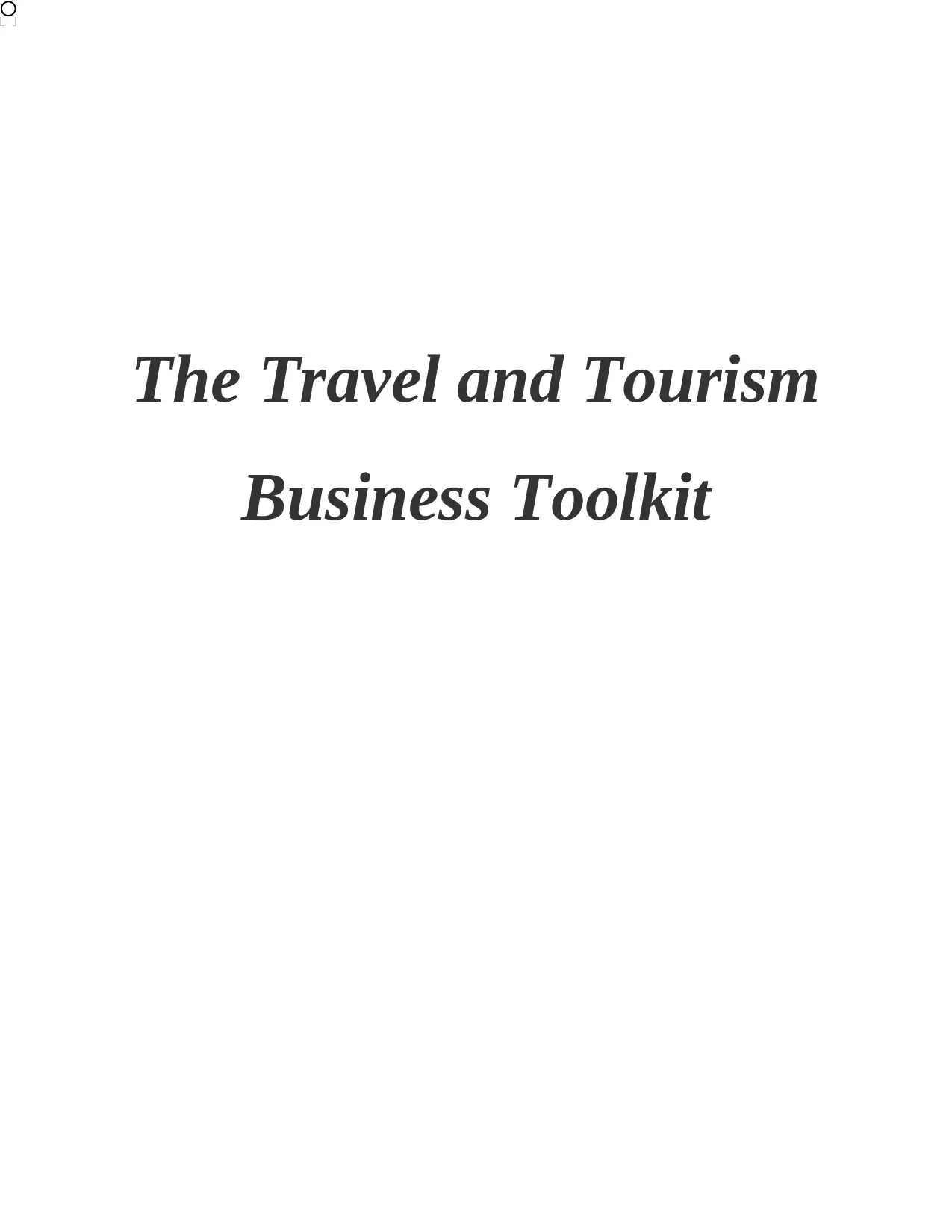
The Travel and Tourism
Business Toolkit
Business Toolkit
Paraphrase This Document
Need a fresh take? Get an instant paraphrase of this document with our AI Paraphraser
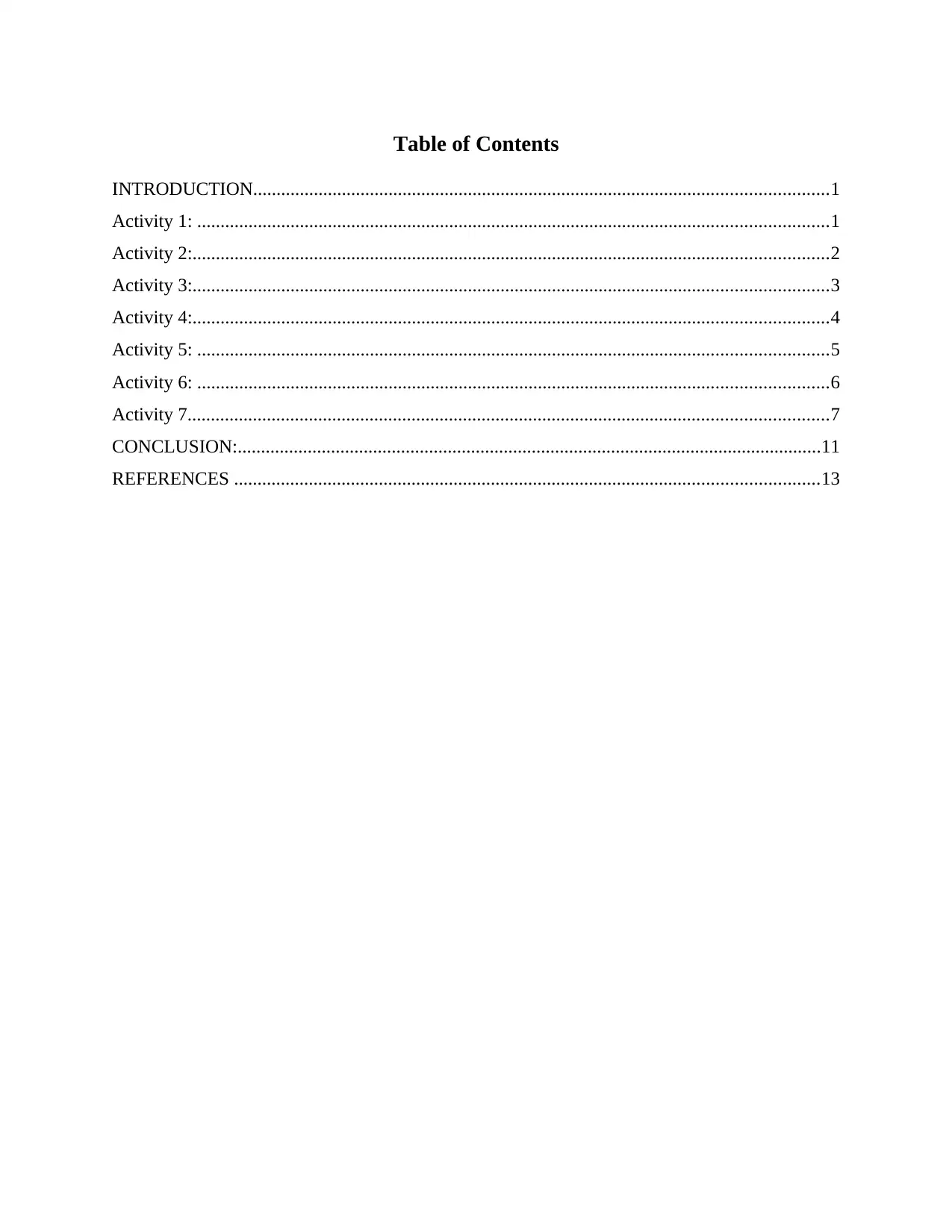
Table of Contents
INTRODUCTION...........................................................................................................................1
Activity 1: .......................................................................................................................................1
Activity 2:........................................................................................................................................2
Activity 3:........................................................................................................................................3
Activity 4:........................................................................................................................................4
Activity 5: .......................................................................................................................................5
Activity 6: .......................................................................................................................................6
Activity 7.........................................................................................................................................7
CONCLUSION:.............................................................................................................................11
REFERENCES .............................................................................................................................13
INTRODUCTION...........................................................................................................................1
Activity 1: .......................................................................................................................................1
Activity 2:........................................................................................................................................2
Activity 3:........................................................................................................................................3
Activity 4:........................................................................................................................................4
Activity 5: .......................................................................................................................................5
Activity 6: .......................................................................................................................................6
Activity 7.........................................................................................................................................7
CONCLUSION:.............................................................................................................................11
REFERENCES .............................................................................................................................13

⊘ This is a preview!⊘
Do you want full access?
Subscribe today to unlock all pages.

Trusted by 1+ million students worldwide
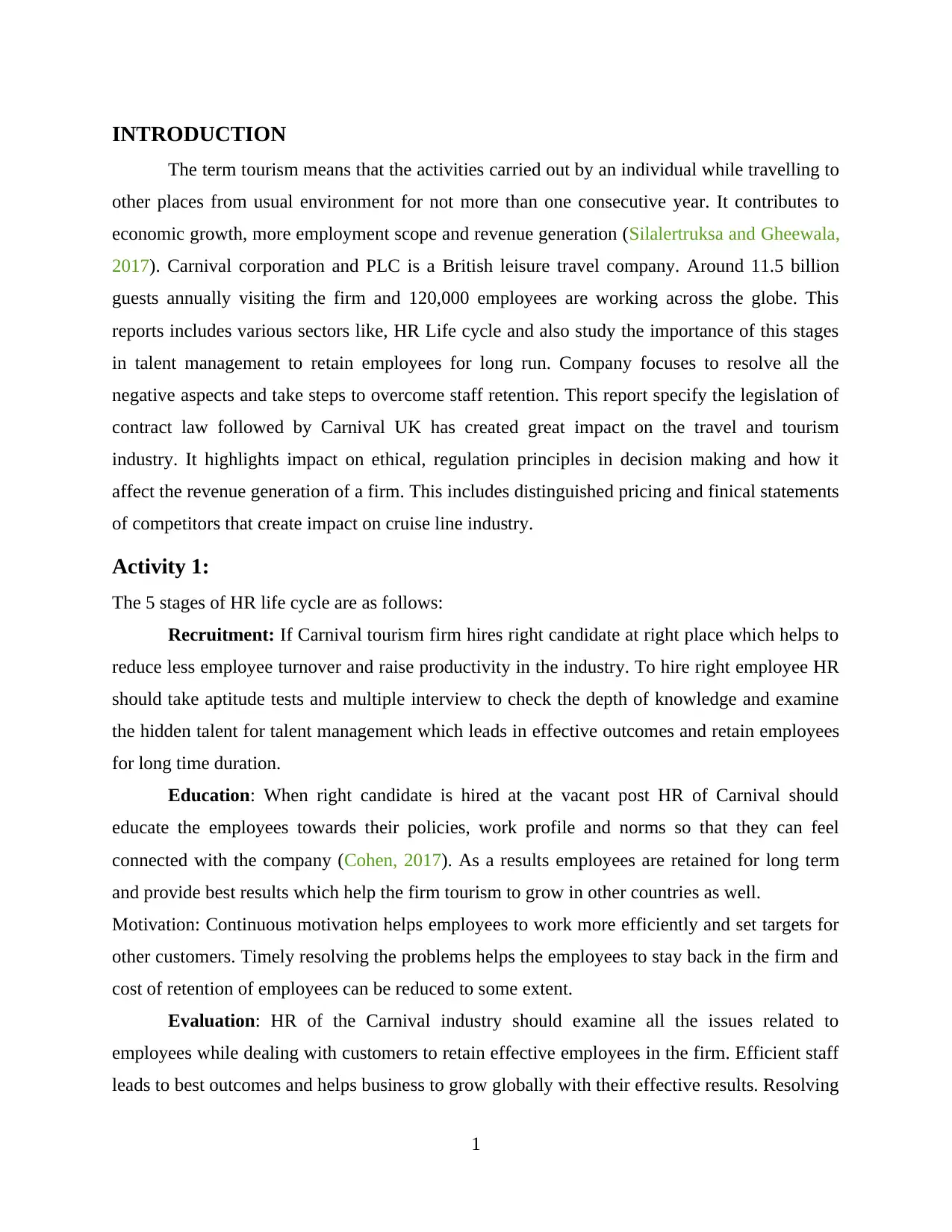
INTRODUCTION
The term tourism means that the activities carried out by an individual while travelling to
other places from usual environment for not more than one consecutive year. It contributes to
economic growth, more employment scope and revenue generation (Silalertruksa and Gheewala,
2017). Carnival corporation and PLC is a British leisure travel company. Around 11.5 billion
guests annually visiting the firm and 120,000 employees are working across the globe. This
reports includes various sectors like, HR Life cycle and also study the importance of this stages
in talent management to retain employees for long run. Company focuses to resolve all the
negative aspects and take steps to overcome staff retention. This report specify the legislation of
contract law followed by Carnival UK has created great impact on the travel and tourism
industry. It highlights impact on ethical, regulation principles in decision making and how it
affect the revenue generation of a firm. This includes distinguished pricing and finical statements
of competitors that create impact on cruise line industry.
Activity 1:
The 5 stages of HR life cycle are as follows:
Recruitment: If Carnival tourism firm hires right candidate at right place which helps to
reduce less employee turnover and raise productivity in the industry. To hire right employee HR
should take aptitude tests and multiple interview to check the depth of knowledge and examine
the hidden talent for talent management which leads in effective outcomes and retain employees
for long time duration.
Education: When right candidate is hired at the vacant post HR of Carnival should
educate the employees towards their policies, work profile and norms so that they can feel
connected with the company (Cohen, 2017). As a results employees are retained for long term
and provide best results which help the firm tourism to grow in other countries as well.
Motivation: Continuous motivation helps employees to work more efficiently and set targets for
other customers. Timely resolving the problems helps the employees to stay back in the firm and
cost of retention of employees can be reduced to some extent.
Evaluation: HR of the Carnival industry should examine all the issues related to
employees while dealing with customers to retain effective employees in the firm. Efficient staff
leads to best outcomes and helps business to grow globally with their effective results. Resolving
1
The term tourism means that the activities carried out by an individual while travelling to
other places from usual environment for not more than one consecutive year. It contributes to
economic growth, more employment scope and revenue generation (Silalertruksa and Gheewala,
2017). Carnival corporation and PLC is a British leisure travel company. Around 11.5 billion
guests annually visiting the firm and 120,000 employees are working across the globe. This
reports includes various sectors like, HR Life cycle and also study the importance of this stages
in talent management to retain employees for long run. Company focuses to resolve all the
negative aspects and take steps to overcome staff retention. This report specify the legislation of
contract law followed by Carnival UK has created great impact on the travel and tourism
industry. It highlights impact on ethical, regulation principles in decision making and how it
affect the revenue generation of a firm. This includes distinguished pricing and finical statements
of competitors that create impact on cruise line industry.
Activity 1:
The 5 stages of HR life cycle are as follows:
Recruitment: If Carnival tourism firm hires right candidate at right place which helps to
reduce less employee turnover and raise productivity in the industry. To hire right employee HR
should take aptitude tests and multiple interview to check the depth of knowledge and examine
the hidden talent for talent management which leads in effective outcomes and retain employees
for long time duration.
Education: When right candidate is hired at the vacant post HR of Carnival should
educate the employees towards their policies, work profile and norms so that they can feel
connected with the company (Cohen, 2017). As a results employees are retained for long term
and provide best results which help the firm tourism to grow in other countries as well.
Motivation: Continuous motivation helps employees to work more efficiently and set targets for
other customers. Timely resolving the problems helps the employees to stay back in the firm and
cost of retention of employees can be reduced to some extent.
Evaluation: HR of the Carnival industry should examine all the issues related to
employees while dealing with customers to retain effective employees in the firm. Efficient staff
leads to best outcomes and helps business to grow globally with their effective results. Resolving
1
Paraphrase This Document
Need a fresh take? Get an instant paraphrase of this document with our AI Paraphraser
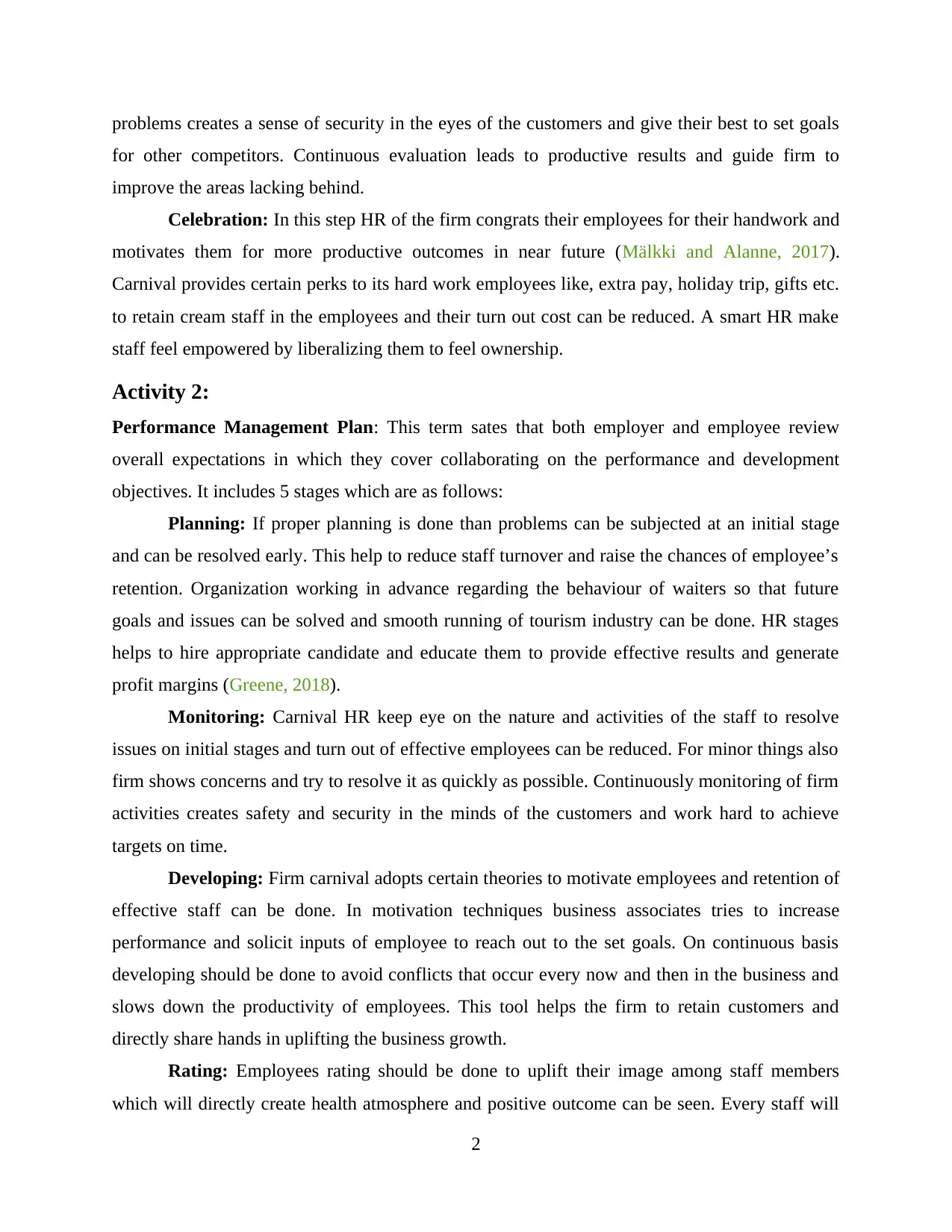
problems creates a sense of security in the eyes of the customers and give their best to set goals
for other competitors. Continuous evaluation leads to productive results and guide firm to
improve the areas lacking behind.
Celebration: In this step HR of the firm congrats their employees for their handwork and
motivates them for more productive outcomes in near future (Mälkki and Alanne, 2017).
Carnival provides certain perks to its hard work employees like, extra pay, holiday trip, gifts etc.
to retain cream staff in the employees and their turn out cost can be reduced. A smart HR make
staff feel empowered by liberalizing them to feel ownership.
Activity 2:
Performance Management Plan: This term sates that both employer and employee review
overall expectations in which they cover collaborating on the performance and development
objectives. It includes 5 stages which are as follows:
Planning: If proper planning is done than problems can be subjected at an initial stage
and can be resolved early. This help to reduce staff turnover and raise the chances of employee’s
retention. Organization working in advance regarding the behaviour of waiters so that future
goals and issues can be solved and smooth running of tourism industry can be done. HR stages
helps to hire appropriate candidate and educate them to provide effective results and generate
profit margins (Greene, 2018).
Monitoring: Carnival HR keep eye on the nature and activities of the staff to resolve
issues on initial stages and turn out of effective employees can be reduced. For minor things also
firm shows concerns and try to resolve it as quickly as possible. Continuously monitoring of firm
activities creates safety and security in the minds of the customers and work hard to achieve
targets on time.
Developing: Firm carnival adopts certain theories to motivate employees and retention of
effective staff can be done. In motivation techniques business associates tries to increase
performance and solicit inputs of employee to reach out to the set goals. On continuous basis
developing should be done to avoid conflicts that occur every now and then in the business and
slows down the productivity of employees. This tool helps the firm to retain customers and
directly share hands in uplifting the business growth.
Rating: Employees rating should be done to uplift their image among staff members
which will directly create health atmosphere and positive outcome can be seen. Every staff will
2
for other competitors. Continuous evaluation leads to productive results and guide firm to
improve the areas lacking behind.
Celebration: In this step HR of the firm congrats their employees for their handwork and
motivates them for more productive outcomes in near future (Mälkki and Alanne, 2017).
Carnival provides certain perks to its hard work employees like, extra pay, holiday trip, gifts etc.
to retain cream staff in the employees and their turn out cost can be reduced. A smart HR make
staff feel empowered by liberalizing them to feel ownership.
Activity 2:
Performance Management Plan: This term sates that both employer and employee review
overall expectations in which they cover collaborating on the performance and development
objectives. It includes 5 stages which are as follows:
Planning: If proper planning is done than problems can be subjected at an initial stage
and can be resolved early. This help to reduce staff turnover and raise the chances of employee’s
retention. Organization working in advance regarding the behaviour of waiters so that future
goals and issues can be solved and smooth running of tourism industry can be done. HR stages
helps to hire appropriate candidate and educate them to provide effective results and generate
profit margins (Greene, 2018).
Monitoring: Carnival HR keep eye on the nature and activities of the staff to resolve
issues on initial stages and turn out of effective employees can be reduced. For minor things also
firm shows concerns and try to resolve it as quickly as possible. Continuously monitoring of firm
activities creates safety and security in the minds of the customers and work hard to achieve
targets on time.
Developing: Firm carnival adopts certain theories to motivate employees and retention of
effective staff can be done. In motivation techniques business associates tries to increase
performance and solicit inputs of employee to reach out to the set goals. On continuous basis
developing should be done to avoid conflicts that occur every now and then in the business and
slows down the productivity of employees. This tool helps the firm to retain customers and
directly share hands in uplifting the business growth.
Rating: Employees rating should be done to uplift their image among staff members
which will directly create health atmosphere and positive outcome can be seen. Every staff will
2
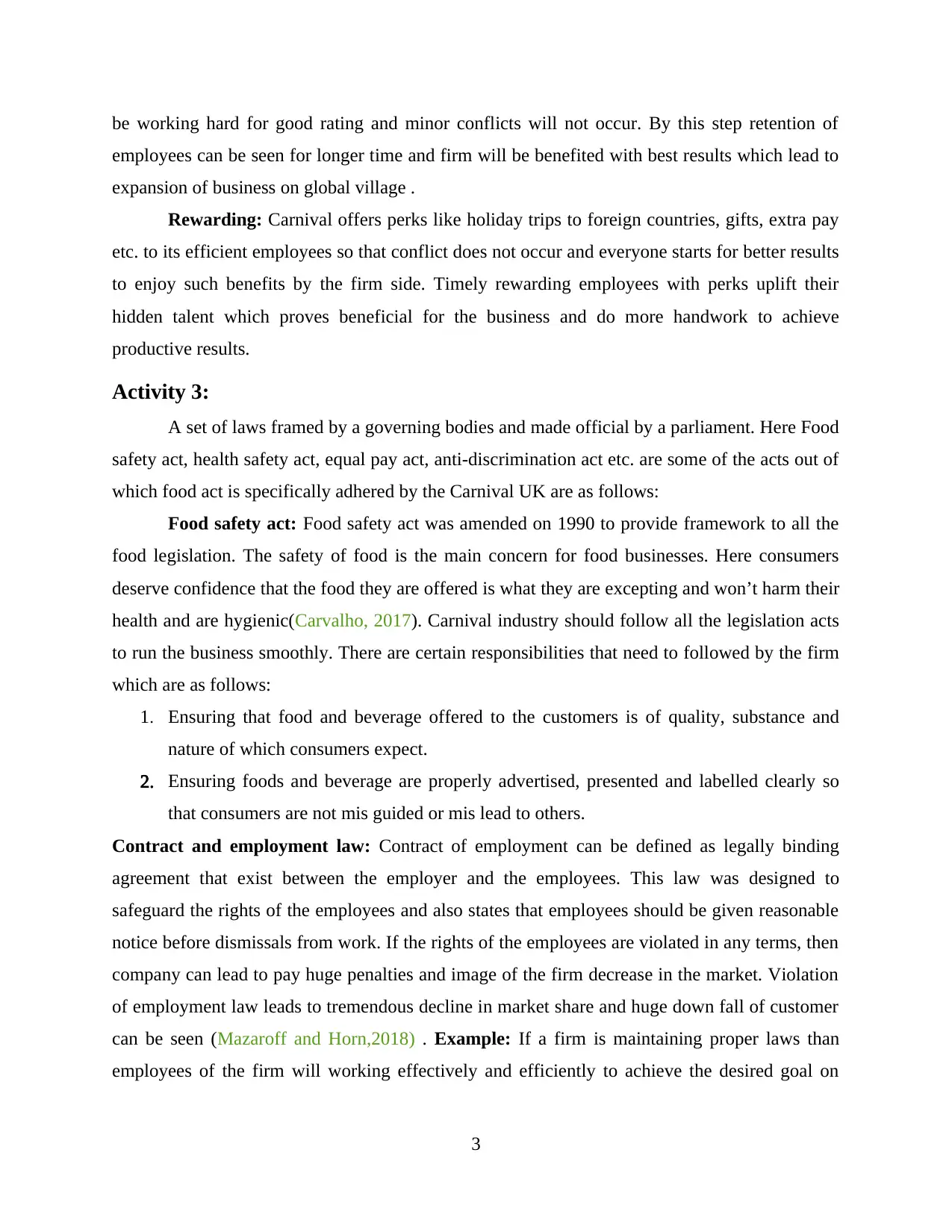
be working hard for good rating and minor conflicts will not occur. By this step retention of
employees can be seen for longer time and firm will be benefited with best results which lead to
expansion of business on global village .
Rewarding: Carnival offers perks like holiday trips to foreign countries, gifts, extra pay
etc. to its efficient employees so that conflict does not occur and everyone starts for better results
to enjoy such benefits by the firm side. Timely rewarding employees with perks uplift their
hidden talent which proves beneficial for the business and do more handwork to achieve
productive results.
Activity 3:
A set of laws framed by a governing bodies and made official by a parliament. Here Food
safety act, health safety act, equal pay act, anti-discrimination act etc. are some of the acts out of
which food act is specifically adhered by the Carnival UK are as follows:
Food safety act: Food safety act was amended on 1990 to provide framework to all the
food legislation. The safety of food is the main concern for food businesses. Here consumers
deserve confidence that the food they are offered is what they are excepting and won’t harm their
health and are hygienic(Carvalho, 2017). Carnival industry should follow all the legislation acts
to run the business smoothly. There are certain responsibilities that need to followed by the firm
which are as follows:
1. Ensuring that food and beverage offered to the customers is of quality, substance and
nature of which consumers expect.
2. Ensuring foods and beverage are properly advertised, presented and labelled clearly so
that consumers are not mis guided or mis lead to others.
Contract and employment law: Contract of employment can be defined as legally binding
agreement that exist between the employer and the employees. This law was designed to
safeguard the rights of the employees and also states that employees should be given reasonable
notice before dismissals from work. If the rights of the employees are violated in any terms, then
company can lead to pay huge penalties and image of the firm decrease in the market. Violation
of employment law leads to tremendous decline in market share and huge down fall of customer
can be seen (Mazaroff and Horn,2018) . Example: If a firm is maintaining proper laws than
employees of the firm will working effectively and efficiently to achieve the desired goal on
3
employees can be seen for longer time and firm will be benefited with best results which lead to
expansion of business on global village .
Rewarding: Carnival offers perks like holiday trips to foreign countries, gifts, extra pay
etc. to its efficient employees so that conflict does not occur and everyone starts for better results
to enjoy such benefits by the firm side. Timely rewarding employees with perks uplift their
hidden talent which proves beneficial for the business and do more handwork to achieve
productive results.
Activity 3:
A set of laws framed by a governing bodies and made official by a parliament. Here Food
safety act, health safety act, equal pay act, anti-discrimination act etc. are some of the acts out of
which food act is specifically adhered by the Carnival UK are as follows:
Food safety act: Food safety act was amended on 1990 to provide framework to all the
food legislation. The safety of food is the main concern for food businesses. Here consumers
deserve confidence that the food they are offered is what they are excepting and won’t harm their
health and are hygienic(Carvalho, 2017). Carnival industry should follow all the legislation acts
to run the business smoothly. There are certain responsibilities that need to followed by the firm
which are as follows:
1. Ensuring that food and beverage offered to the customers is of quality, substance and
nature of which consumers expect.
2. Ensuring foods and beverage are properly advertised, presented and labelled clearly so
that consumers are not mis guided or mis lead to others.
Contract and employment law: Contract of employment can be defined as legally binding
agreement that exist between the employer and the employees. This law was designed to
safeguard the rights of the employees and also states that employees should be given reasonable
notice before dismissals from work. If the rights of the employees are violated in any terms, then
company can lead to pay huge penalties and image of the firm decrease in the market. Violation
of employment law leads to tremendous decline in market share and huge down fall of customer
can be seen (Mazaroff and Horn,2018) . Example: If a firm is maintaining proper laws than
employees of the firm will working effectively and efficiently to achieve the desired goal on
3
⊘ This is a preview!⊘
Do you want full access?
Subscribe today to unlock all pages.

Trusted by 1+ million students worldwide
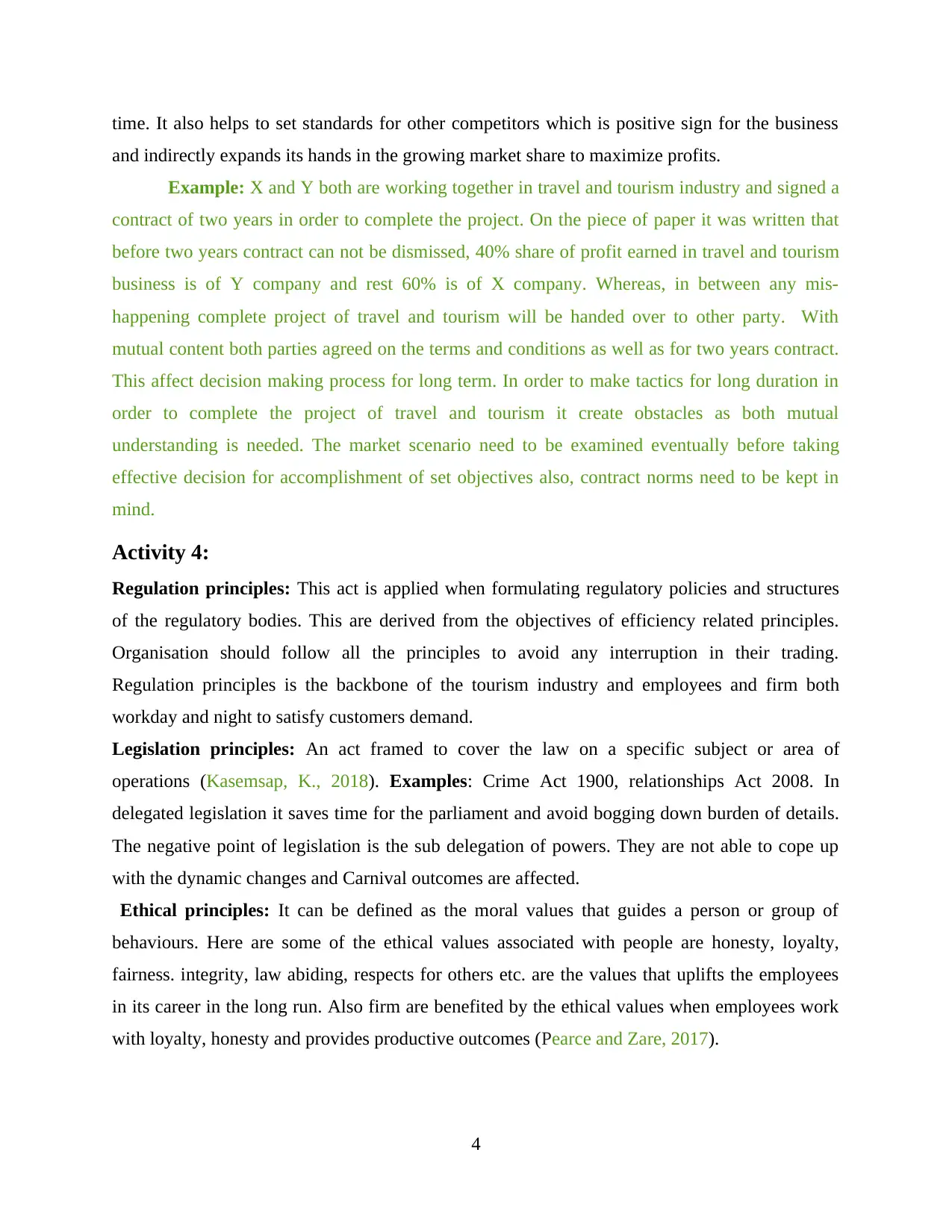
time. It also helps to set standards for other competitors which is positive sign for the business
and indirectly expands its hands in the growing market share to maximize profits.
Example: X and Y both are working together in travel and tourism industry and signed a
contract of two years in order to complete the project. On the piece of paper it was written that
before two years contract can not be dismissed, 40% share of profit earned in travel and tourism
business is of Y company and rest 60% is of X company. Whereas, in between any mis-
happening complete project of travel and tourism will be handed over to other party. With
mutual content both parties agreed on the terms and conditions as well as for two years contract.
This affect decision making process for long term. In order to make tactics for long duration in
order to complete the project of travel and tourism it create obstacles as both mutual
understanding is needed. The market scenario need to be examined eventually before taking
effective decision for accomplishment of set objectives also, contract norms need to be kept in
mind.
Activity 4:
Regulation principles: This act is applied when formulating regulatory policies and structures
of the regulatory bodies. This are derived from the objectives of efficiency related principles.
Organisation should follow all the principles to avoid any interruption in their trading.
Regulation principles is the backbone of the tourism industry and employees and firm both
workday and night to satisfy customers demand.
Legislation principles: An act framed to cover the law on a specific subject or area of
operations (Kasemsap, K., 2018). Examples: Crime Act 1900, relationships Act 2008. In
delegated legislation it saves time for the parliament and avoid bogging down burden of details.
The negative point of legislation is the sub delegation of powers. They are not able to cope up
with the dynamic changes and Carnival outcomes are affected.
Ethical principles: It can be defined as the moral values that guides a person or group of
behaviours. Here are some of the ethical values associated with people are honesty, loyalty,
fairness. integrity, law abiding, respects for others etc. are the values that uplifts the employees
in its career in the long run. Also firm are benefited by the ethical values when employees work
with loyalty, honesty and provides productive outcomes (Pearce and Zare, 2017).
4
and indirectly expands its hands in the growing market share to maximize profits.
Example: X and Y both are working together in travel and tourism industry and signed a
contract of two years in order to complete the project. On the piece of paper it was written that
before two years contract can not be dismissed, 40% share of profit earned in travel and tourism
business is of Y company and rest 60% is of X company. Whereas, in between any mis-
happening complete project of travel and tourism will be handed over to other party. With
mutual content both parties agreed on the terms and conditions as well as for two years contract.
This affect decision making process for long term. In order to make tactics for long duration in
order to complete the project of travel and tourism it create obstacles as both mutual
understanding is needed. The market scenario need to be examined eventually before taking
effective decision for accomplishment of set objectives also, contract norms need to be kept in
mind.
Activity 4:
Regulation principles: This act is applied when formulating regulatory policies and structures
of the regulatory bodies. This are derived from the objectives of efficiency related principles.
Organisation should follow all the principles to avoid any interruption in their trading.
Regulation principles is the backbone of the tourism industry and employees and firm both
workday and night to satisfy customers demand.
Legislation principles: An act framed to cover the law on a specific subject or area of
operations (Kasemsap, K., 2018). Examples: Crime Act 1900, relationships Act 2008. In
delegated legislation it saves time for the parliament and avoid bogging down burden of details.
The negative point of legislation is the sub delegation of powers. They are not able to cope up
with the dynamic changes and Carnival outcomes are affected.
Ethical principles: It can be defined as the moral values that guides a person or group of
behaviours. Here are some of the ethical values associated with people are honesty, loyalty,
fairness. integrity, law abiding, respects for others etc. are the values that uplifts the employees
in its career in the long run. Also firm are benefited by the ethical values when employees work
with loyalty, honesty and provides productive outcomes (Pearce and Zare, 2017).
4
Paraphrase This Document
Need a fresh take? Get an instant paraphrase of this document with our AI Paraphraser
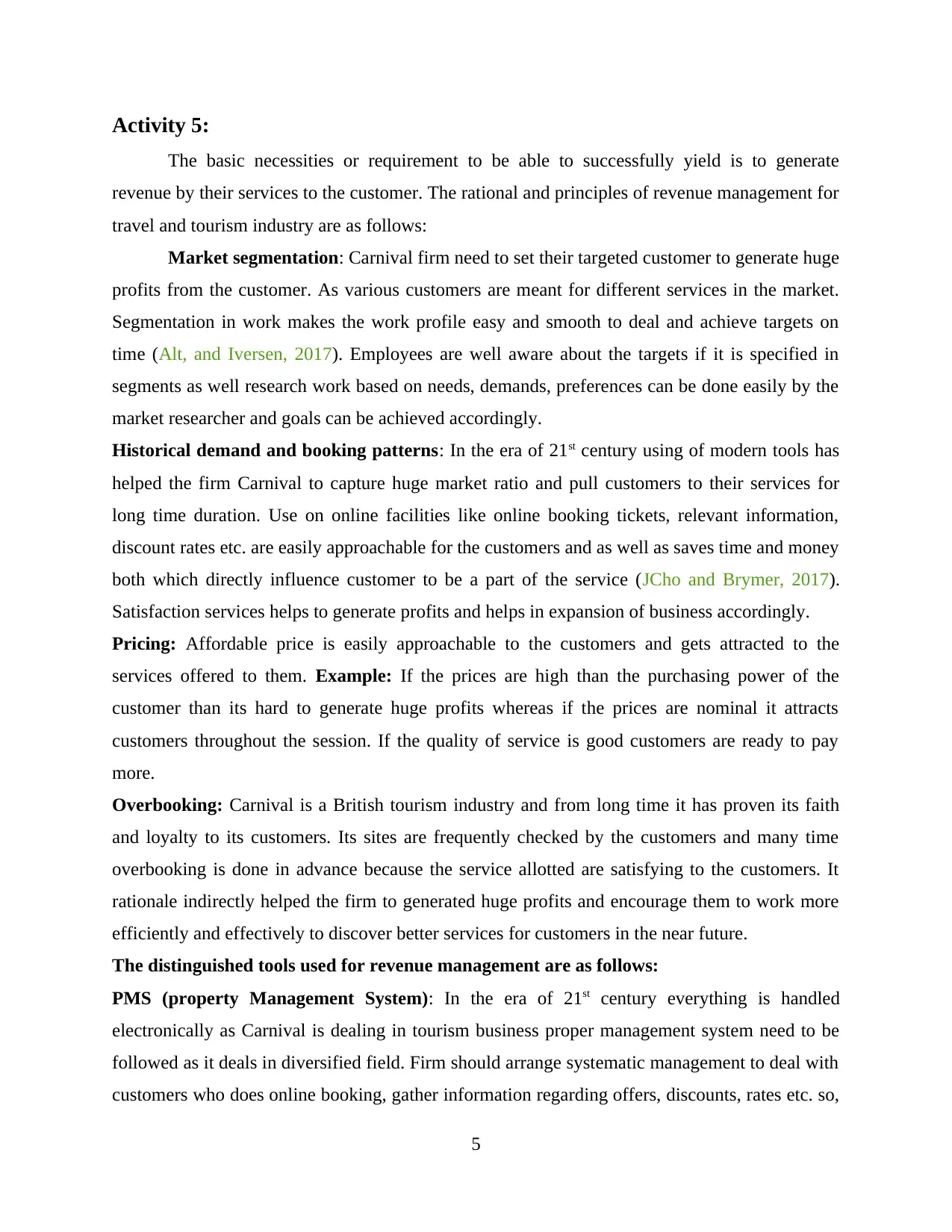
Activity 5:
The basic necessities or requirement to be able to successfully yield is to generate
revenue by their services to the customer. The rational and principles of revenue management for
travel and tourism industry are as follows:
Market segmentation: Carnival firm need to set their targeted customer to generate huge
profits from the customer. As various customers are meant for different services in the market.
Segmentation in work makes the work profile easy and smooth to deal and achieve targets on
time (Alt, and Iversen, 2017). Employees are well aware about the targets if it is specified in
segments as well research work based on needs, demands, preferences can be done easily by the
market researcher and goals can be achieved accordingly.
Historical demand and booking patterns: In the era of 21st century using of modern tools has
helped the firm Carnival to capture huge market ratio and pull customers to their services for
long time duration. Use on online facilities like online booking tickets, relevant information,
discount rates etc. are easily approachable for the customers and as well as saves time and money
both which directly influence customer to be a part of the service (JCho and Brymer, 2017).
Satisfaction services helps to generate profits and helps in expansion of business accordingly.
Pricing: Affordable price is easily approachable to the customers and gets attracted to the
services offered to them. Example: If the prices are high than the purchasing power of the
customer than its hard to generate huge profits whereas if the prices are nominal it attracts
customers throughout the session. If the quality of service is good customers are ready to pay
more.
Overbooking: Carnival is a British tourism industry and from long time it has proven its faith
and loyalty to its customers. Its sites are frequently checked by the customers and many time
overbooking is done in advance because the service allotted are satisfying to the customers. It
rationale indirectly helped the firm to generated huge profits and encourage them to work more
efficiently and effectively to discover better services for customers in the near future.
The distinguished tools used for revenue management are as follows:
PMS (property Management System): In the era of 21st century everything is handled
electronically as Carnival is dealing in tourism business proper management system need to be
followed as it deals in diversified field. Firm should arrange systematic management to deal with
customers who does online booking, gather information regarding offers, discounts, rates etc. so,
5
The basic necessities or requirement to be able to successfully yield is to generate
revenue by their services to the customer. The rational and principles of revenue management for
travel and tourism industry are as follows:
Market segmentation: Carnival firm need to set their targeted customer to generate huge
profits from the customer. As various customers are meant for different services in the market.
Segmentation in work makes the work profile easy and smooth to deal and achieve targets on
time (Alt, and Iversen, 2017). Employees are well aware about the targets if it is specified in
segments as well research work based on needs, demands, preferences can be done easily by the
market researcher and goals can be achieved accordingly.
Historical demand and booking patterns: In the era of 21st century using of modern tools has
helped the firm Carnival to capture huge market ratio and pull customers to their services for
long time duration. Use on online facilities like online booking tickets, relevant information,
discount rates etc. are easily approachable for the customers and as well as saves time and money
both which directly influence customer to be a part of the service (JCho and Brymer, 2017).
Satisfaction services helps to generate profits and helps in expansion of business accordingly.
Pricing: Affordable price is easily approachable to the customers and gets attracted to the
services offered to them. Example: If the prices are high than the purchasing power of the
customer than its hard to generate huge profits whereas if the prices are nominal it attracts
customers throughout the session. If the quality of service is good customers are ready to pay
more.
Overbooking: Carnival is a British tourism industry and from long time it has proven its faith
and loyalty to its customers. Its sites are frequently checked by the customers and many time
overbooking is done in advance because the service allotted are satisfying to the customers. It
rationale indirectly helped the firm to generated huge profits and encourage them to work more
efficiently and effectively to discover better services for customers in the near future.
The distinguished tools used for revenue management are as follows:
PMS (property Management System): In the era of 21st century everything is handled
electronically as Carnival is dealing in tourism business proper management system need to be
followed as it deals in diversified field. Firm should arrange systematic management to deal with
customers who does online booking, gather information regarding offers, discounts, rates etc. so,
5
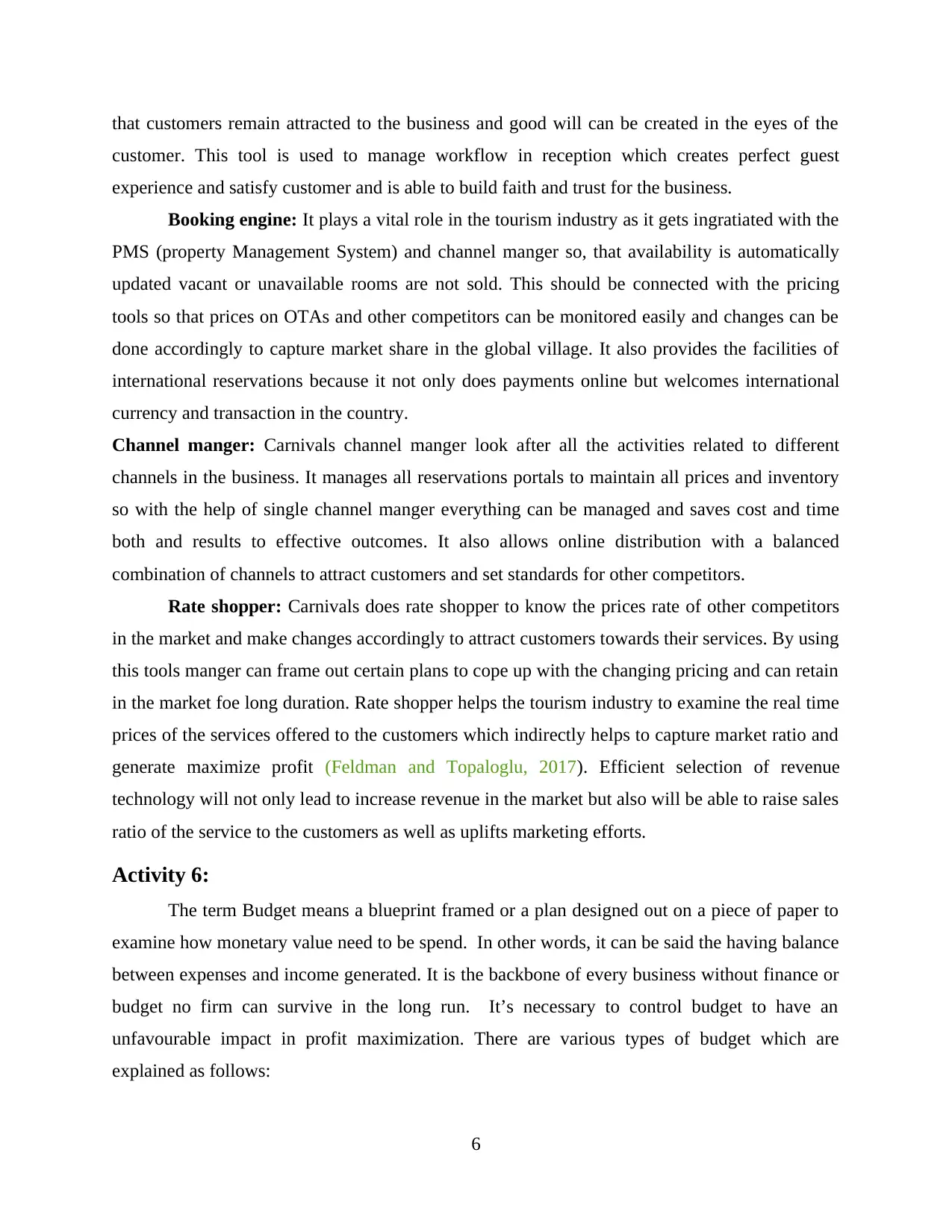
that customers remain attracted to the business and good will can be created in the eyes of the
customer. This tool is used to manage workflow in reception which creates perfect guest
experience and satisfy customer and is able to build faith and trust for the business.
Booking engine: It plays a vital role in the tourism industry as it gets ingratiated with the
PMS (property Management System) and channel manger so, that availability is automatically
updated vacant or unavailable rooms are not sold. This should be connected with the pricing
tools so that prices on OTAs and other competitors can be monitored easily and changes can be
done accordingly to capture market share in the global village. It also provides the facilities of
international reservations because it not only does payments online but welcomes international
currency and transaction in the country.
Channel manger: Carnivals channel manger look after all the activities related to different
channels in the business. It manages all reservations portals to maintain all prices and inventory
so with the help of single channel manger everything can be managed and saves cost and time
both and results to effective outcomes. It also allows online distribution with a balanced
combination of channels to attract customers and set standards for other competitors.
Rate shopper: Carnivals does rate shopper to know the prices rate of other competitors
in the market and make changes accordingly to attract customers towards their services. By using
this tools manger can frame out certain plans to cope up with the changing pricing and can retain
in the market foe long duration. Rate shopper helps the tourism industry to examine the real time
prices of the services offered to the customers which indirectly helps to capture market ratio and
generate maximize profit (Feldman and Topaloglu, 2017). Efficient selection of revenue
technology will not only lead to increase revenue in the market but also will be able to raise sales
ratio of the service to the customers as well as uplifts marketing efforts.
Activity 6:
The term Budget means a blueprint framed or a plan designed out on a piece of paper to
examine how monetary value need to be spend. In other words, it can be said the having balance
between expenses and income generated. It is the backbone of every business without finance or
budget no firm can survive in the long run. It’s necessary to control budget to have an
unfavourable impact in profit maximization. There are various types of budget which are
explained as follows:
6
customer. This tool is used to manage workflow in reception which creates perfect guest
experience and satisfy customer and is able to build faith and trust for the business.
Booking engine: It plays a vital role in the tourism industry as it gets ingratiated with the
PMS (property Management System) and channel manger so, that availability is automatically
updated vacant or unavailable rooms are not sold. This should be connected with the pricing
tools so that prices on OTAs and other competitors can be monitored easily and changes can be
done accordingly to capture market share in the global village. It also provides the facilities of
international reservations because it not only does payments online but welcomes international
currency and transaction in the country.
Channel manger: Carnivals channel manger look after all the activities related to different
channels in the business. It manages all reservations portals to maintain all prices and inventory
so with the help of single channel manger everything can be managed and saves cost and time
both and results to effective outcomes. It also allows online distribution with a balanced
combination of channels to attract customers and set standards for other competitors.
Rate shopper: Carnivals does rate shopper to know the prices rate of other competitors
in the market and make changes accordingly to attract customers towards their services. By using
this tools manger can frame out certain plans to cope up with the changing pricing and can retain
in the market foe long duration. Rate shopper helps the tourism industry to examine the real time
prices of the services offered to the customers which indirectly helps to capture market ratio and
generate maximize profit (Feldman and Topaloglu, 2017). Efficient selection of revenue
technology will not only lead to increase revenue in the market but also will be able to raise sales
ratio of the service to the customers as well as uplifts marketing efforts.
Activity 6:
The term Budget means a blueprint framed or a plan designed out on a piece of paper to
examine how monetary value need to be spend. In other words, it can be said the having balance
between expenses and income generated. It is the backbone of every business without finance or
budget no firm can survive in the long run. It’s necessary to control budget to have an
unfavourable impact in profit maximization. There are various types of budget which are
explained as follows:
6
⊘ This is a preview!⊘
Do you want full access?
Subscribe today to unlock all pages.

Trusted by 1+ million students worldwide
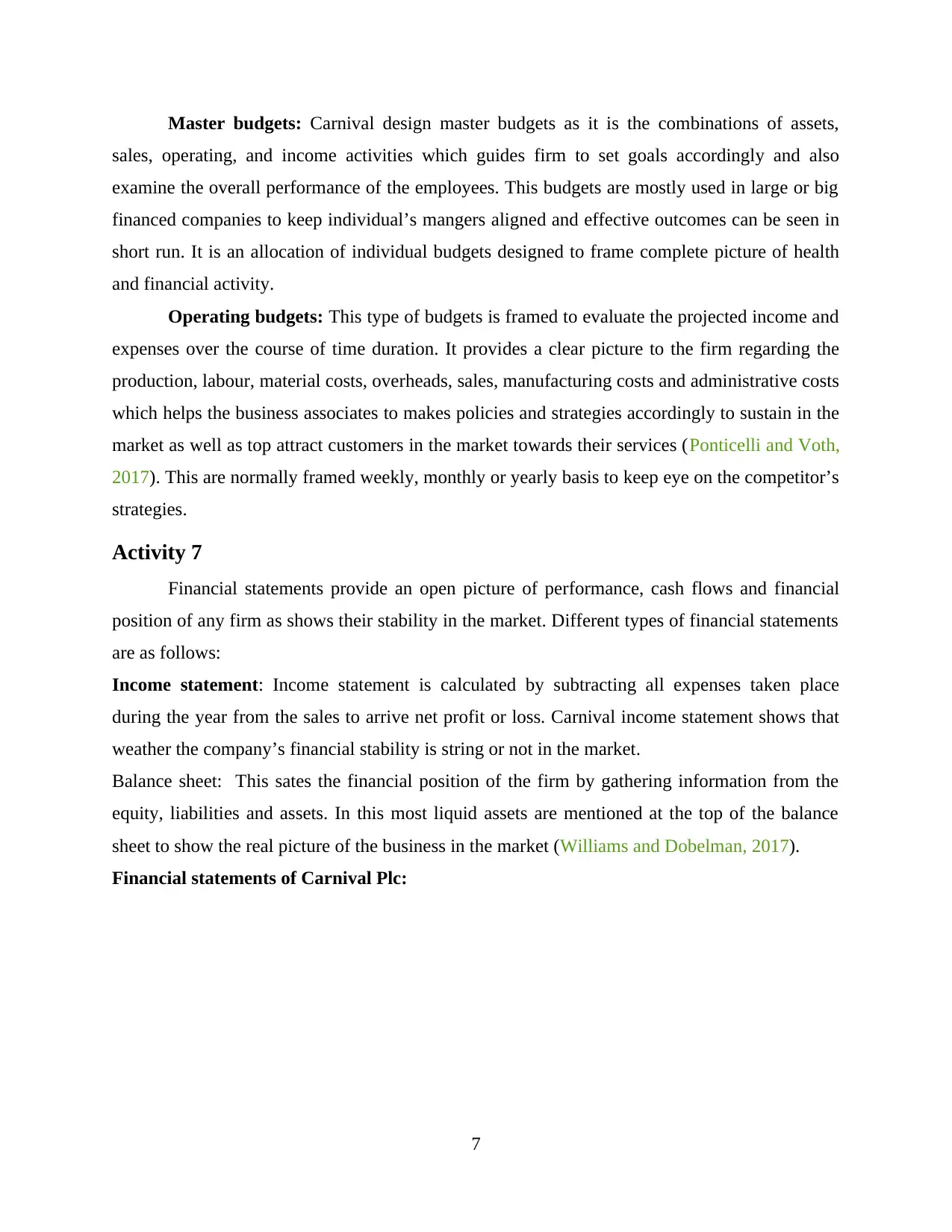
Master budgets: Carnival design master budgets as it is the combinations of assets,
sales, operating, and income activities which guides firm to set goals accordingly and also
examine the overall performance of the employees. This budgets are mostly used in large or big
financed companies to keep individual’s mangers aligned and effective outcomes can be seen in
short run. It is an allocation of individual budgets designed to frame complete picture of health
and financial activity.
Operating budgets: This type of budgets is framed to evaluate the projected income and
expenses over the course of time duration. It provides a clear picture to the firm regarding the
production, labour, material costs, overheads, sales, manufacturing costs and administrative costs
which helps the business associates to makes policies and strategies accordingly to sustain in the
market as well as top attract customers in the market towards their services (Ponticelli and Voth,
2017). This are normally framed weekly, monthly or yearly basis to keep eye on the competitor’s
strategies.
Activity 7
Financial statements provide an open picture of performance, cash flows and financial
position of any firm as shows their stability in the market. Different types of financial statements
are as follows:
Income statement: Income statement is calculated by subtracting all expenses taken place
during the year from the sales to arrive net profit or loss. Carnival income statement shows that
weather the company’s financial stability is string or not in the market.
Balance sheet: This sates the financial position of the firm by gathering information from the
equity, liabilities and assets. In this most liquid assets are mentioned at the top of the balance
sheet to show the real picture of the business in the market (Williams and Dobelman, 2017).
Financial statements of Carnival Plc:
7
sales, operating, and income activities which guides firm to set goals accordingly and also
examine the overall performance of the employees. This budgets are mostly used in large or big
financed companies to keep individual’s mangers aligned and effective outcomes can be seen in
short run. It is an allocation of individual budgets designed to frame complete picture of health
and financial activity.
Operating budgets: This type of budgets is framed to evaluate the projected income and
expenses over the course of time duration. It provides a clear picture to the firm regarding the
production, labour, material costs, overheads, sales, manufacturing costs and administrative costs
which helps the business associates to makes policies and strategies accordingly to sustain in the
market as well as top attract customers in the market towards their services (Ponticelli and Voth,
2017). This are normally framed weekly, monthly or yearly basis to keep eye on the competitor’s
strategies.
Activity 7
Financial statements provide an open picture of performance, cash flows and financial
position of any firm as shows their stability in the market. Different types of financial statements
are as follows:
Income statement: Income statement is calculated by subtracting all expenses taken place
during the year from the sales to arrive net profit or loss. Carnival income statement shows that
weather the company’s financial stability is string or not in the market.
Balance sheet: This sates the financial position of the firm by gathering information from the
equity, liabilities and assets. In this most liquid assets are mentioned at the top of the balance
sheet to show the real picture of the business in the market (Williams and Dobelman, 2017).
Financial statements of Carnival Plc:
7
Paraphrase This Document
Need a fresh take? Get an instant paraphrase of this document with our AI Paraphraser
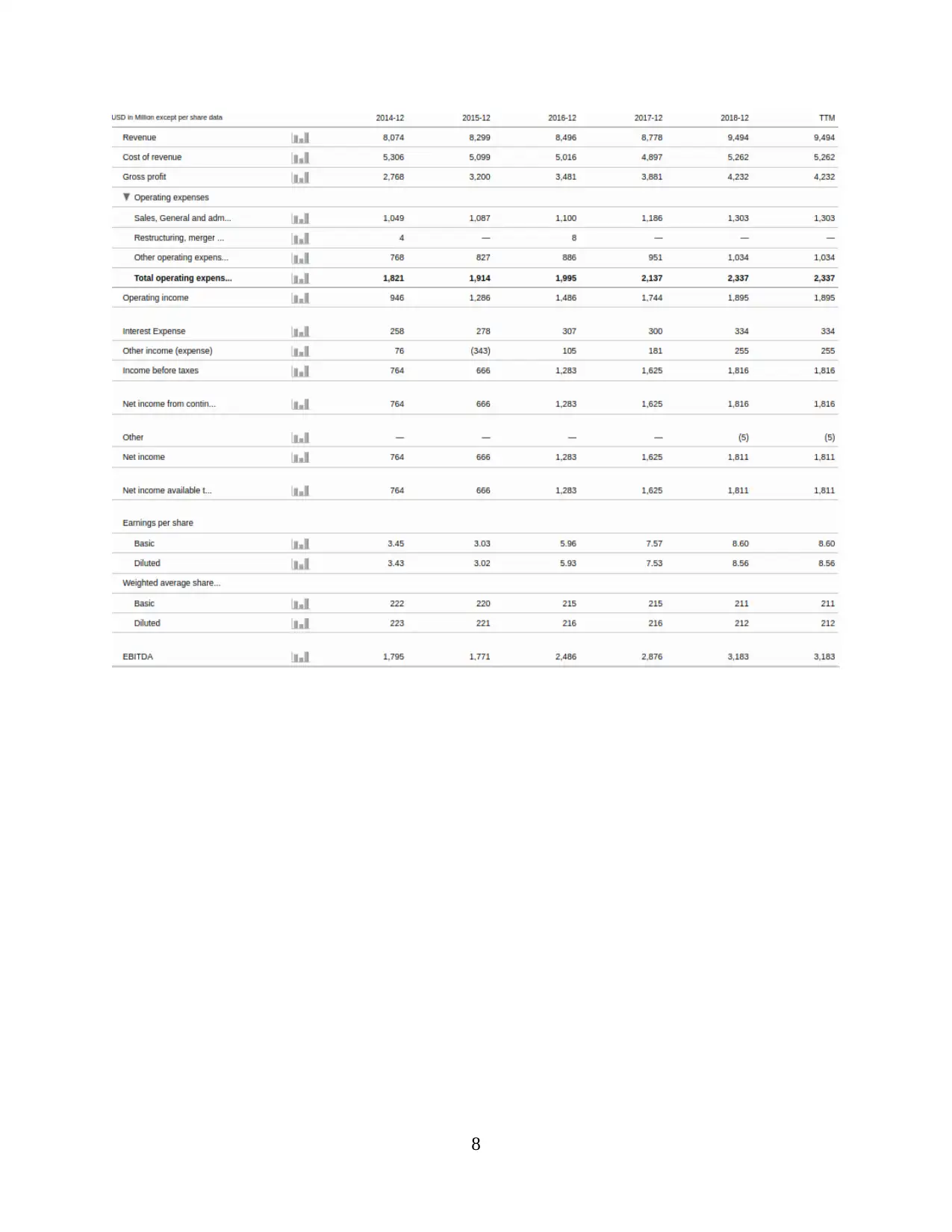
8
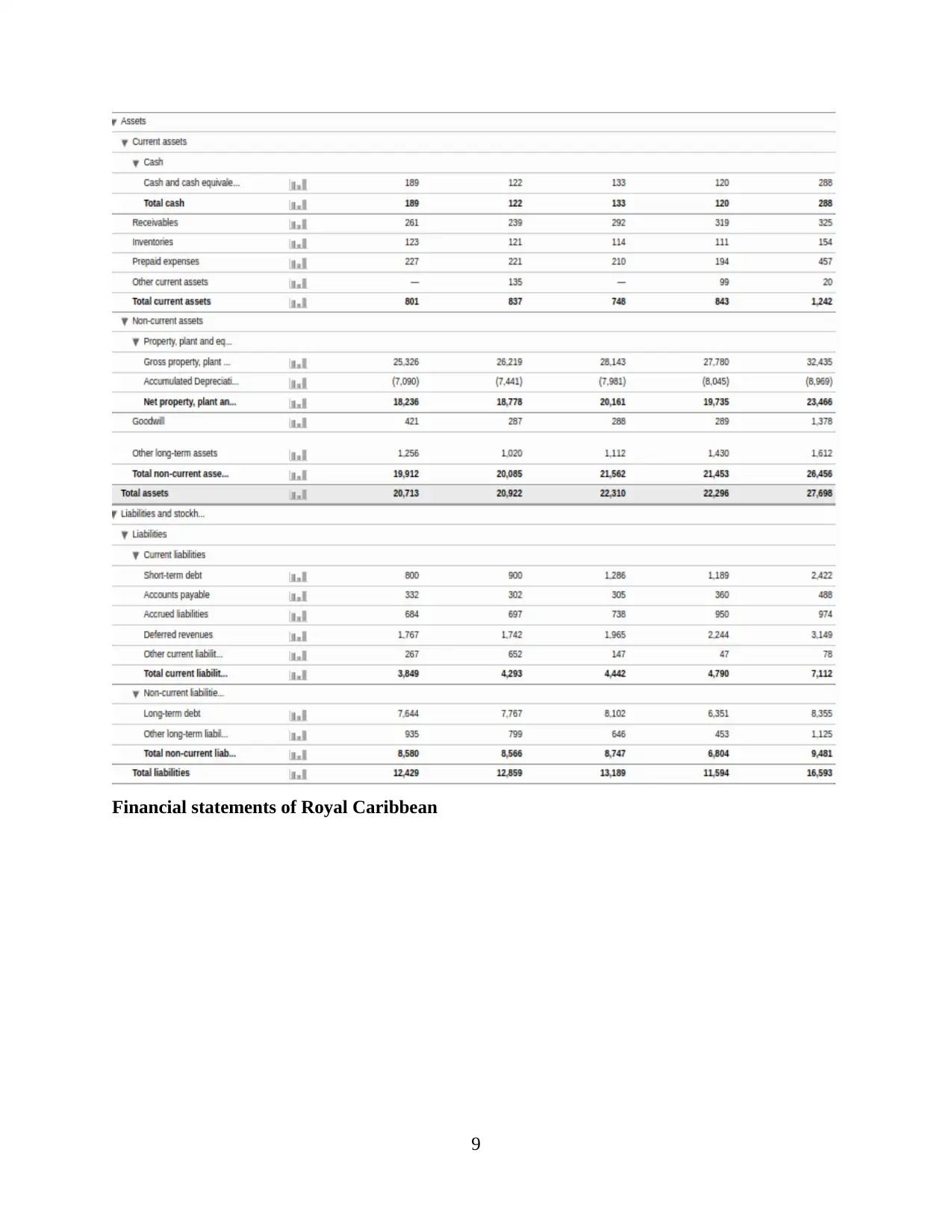
Financial statements of Royal Caribbean
9
9
⊘ This is a preview!⊘
Do you want full access?
Subscribe today to unlock all pages.

Trusted by 1+ million students worldwide
1 out of 16
Related Documents
Your All-in-One AI-Powered Toolkit for Academic Success.
+13062052269
info@desklib.com
Available 24*7 on WhatsApp / Email
![[object Object]](/_next/static/media/star-bottom.7253800d.svg)
Unlock your academic potential
Copyright © 2020–2026 A2Z Services. All Rights Reserved. Developed and managed by ZUCOL.





